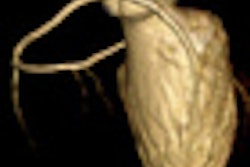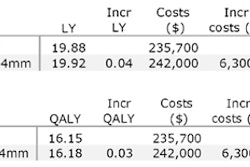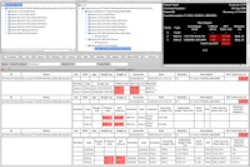Dear AuntMinnie Member,
Cardiac CT is getting safer for children thanks to ultralow-dose techniques, researchers concluded at the Society of Cardiovascular Computed Tomography (SCCT) meeting in Denver last week. In particular, dual-source high-pitch protocols are generating high-quality cardiac images using a fraction of a millisievert of radiation, says a team from the Minneapolis Heart Institute. Get the rest of the story here, or visit our CT Digital Community.
In other SCCT news, following lung nodules detected incidentally at cardiac CT isn't remotely cost-effective -- even in long-term smokers, say researchers from Boston. Click here for our story from international editor Eric Barnes.
Countdown to MIPPA
Are you ready for the Medicare Improvements for Patients and Providers Act (MIPPA)? By January 2012, all healthcare providers who bill for the technical component of advanced imaging services must be accredited, and facilities are likely to be scrambling to meet the fast-approaching deadline.
Along with the stress generated by the time crunch, there's a growing sense that MIPPA's implementation could hurt many facilities' ability to provide imaging services. And further increases in the cost of imaging could be in the offing. To find out why, click here for associate editor Kate Madden Yee's article, or visit our Imaging Leaders Digital Community at leaders.auntminnie.com.
FDA guidance on mobile apps
In late-breaking news, the U.S. Food and Drug Administration (FDA) today issued its draft guidance for the review of medical applications used on smartphones and other mobile computing devices.
How will medical imaging applications be treated under this proposed plan? You can find the details in associate editor Cynthia E. Keen's article, which you can reach here or in our Advanced Visualization Digital Community at av.auntminnie.com.
MRI sheds light on cardiomyopathy
And in MRI news, a study in the July 20 issue of the Journal of the American Medical Association suggests that stress cardiomyopathy may have a broader clinical profile than previously thought.
Using cardiovascular MRI, researchers in Germany found that stress cardiomyopathy's clinical profile may go beyond postmenopausal women to include younger patients, men, and those without an identifiable stressful cause. In addition, cardiovascular MRI could also help quickly confirm or rule out the condition when the patient first presents with symptoms.
Click here to learn more in our story from features editor Wayne Forrest, or visit our MRI Digital Community.





















